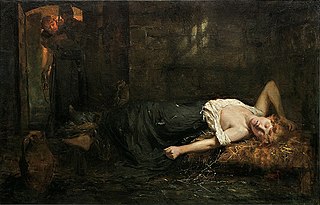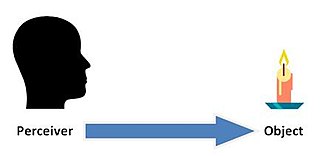
The Latin cogito, ergo sum, usually translated into English as "I think, therefore I am", is the "first principle" of René Descartes's philosophy. He originally published it in French as je pense, donc je suis in his 1637 Discourse on the Method, so as to reach a wider audience than Latin would have allowed. It later appeared in Latin in his Principles of Philosophy, and a similar phrase also featured prominently in his Meditations on First Philosophy. The dictum is also sometimes referred to as the cogito. As Descartes explained in a margin note, "we cannot doubt of our existence while we doubt." In the posthumously published The Search for Truth by Natural Light, he expressed this insight as dubito, ergo sum, vel, quod idem est, cogito, ergo sum. Antoine Léonard Thomas, in a 1765 essay in honor of Descartes presented it as dubito, ergo cogito, ergo sum.

Epistemology, or the theory of knowledge, is the branch of philosophy concerned with knowledge. Epistemology is considered a major subfield of philosophy, along with other major subfields such as ethics, logic, and metaphysics.
Internalism and externalism are two opposite ways of integration of explaining various subjects in several areas of philosophy. These include human motivation, knowledge, justification, meaning, and truth. The distinction arises in many areas of debate with similar but distinct meanings. Internal–external distinction is a distinction used in philosophy to divide an ontology into two parts: an internal part concerning observation related to philosophy, and an external part concerning question related to philosophy.

René Descartes was a French philosopher, scientist, and mathematician, widely considered a seminal figure in the emergence of modern philosophy and science. Mathematics was central to his method of inquiry, and he connected the previously separate fields of geometry and algebra into analytic geometry. Descartes spent much of his working life in the Dutch Republic, initially serving the Dutch States Army, later becoming a central intellectual of the Dutch Golden Age. Although he served a Protestant state and was later counted as a Deist by critics, Descartes was Roman Catholic.

Skepticism, also spelled scepticism, is a questioning attitude or doubt toward knowledge claims that are seen as mere belief or dogma. For example, if a person is skeptical about claims made by their government about an ongoing war then the person doubts that these claims are accurate. In such cases, skeptics normally recommend not disbelief but suspension of belief, i.e. maintaining a neutral attitude that neither affirms nor denies the claim. This attitude is often motivated by the impression that the available evidence is insufficient to support the claim. Formally, skepticism is a topic of interest in philosophy, particularly epistemology. More informally, skepticism as an expression of questioning or doubt can be applied to any topic, such as politics, religion, or pseudoscience. It is often applied within restricted domains, such as morality, atheism, or the supernatural. Some theorists distinguish "good" or moderate skepticism, which seeks strong evidence before accepting a position, from "bad" or radical skepticism, which wants to suspend judgment indefinitely.
In philosophy, rationalism is the epistemological view that "regards reason as the chief source and test of knowledge" or "any view appealing to reason as a source of knowledge or justification". More formally, rationalism is defined as a methodology or a theory "in which the criterion of truth is not sensory but intellectual and deductive".
Solipsism is the philosophical idea that only one's mind is sure to exist. As an epistemological position, solipsism holds that knowledge of anything outside one's own mind is unsure; the external world and other minds cannot be known and might not exist outside the mind.

Discourse on the Method of Rightly Conducting One's Reason and of Seeking Truth in the Sciences is a philosophical and autobiographical treatise published by René Descartes in 1637. It is best known as the source of the famous quotation "Je pense, donc je suis", which occurs in Part IV of the work. A similar argument, without this precise wording, is found in Meditations on First Philosophy (1641), and a Latin version of the same statement Cogito, ergo sum is found in Principles of Philosophy (1644).
The epistemic virtues, as identified by virtue epistemologists, reflect their contention that belief is an ethical process, and thus susceptible to the intellectual virtue or vice of one's own life and personal experiences. Some epistemic virtues have been identified by W. Jay Wood, based on research into the medieval tradition. Virtues are generally defined by good moral character and epistemic virtues are otherwise defined as intellectual virtues.

Meditations on First Philosophy, in which the existence of God and the immortality of the soul are demonstrated is a philosophical treatise by René Descartes first published in Latin in 1641. The French translation was published in 1647 as Méditations Métaphysiques. The title may contain a misreading by the printer, mistaking animae immortalitas for animae immaterialitas, as suspected by A. Baillet.
In philosophy, a distinction is often made between two different kinds of knowledge: knowledge by acquaintance and knowledge by description. Whereas knowledge by description is something like ordinary propositional knowledge, knowledge by acquaintance is familiarity with a person, place, or thing, typically obtained through perceptual experience. According to Bertrand Russell's classic account of acquaintance knowledge, acquaintance is a direct causal interaction between a person and some object that the person is perceiving.

In the philosophy of perception and philosophy of mind, direct or naïve realism, as opposed to indirect or representational realism, are differing models that describe the nature of conscious experiences; out of the metaphysical question of whether the world we see around us is the real world itself or merely an internal perceptual copy of that world generated by our conscious experience.

The evil demon, also known as Deus deceptor, malicious demon, and evil genius, is an epistemological concept that features prominently in Cartesian philosophy. In the first of his 1641 Meditations on First Philosophy, Descartes imagines that a malevolent God or an evil demon, of "utmost power and cunning has employed all his energies in order to deceive me." This malevolent God or evil demon is imagined to present a complete illusion of an external world, so that Descartes can say, "I shall think that the sky, the air, the earth, colours, shapes, sounds and all external things are merely the delusions of dreams which he has devised to ensnare my judgement. I shall consider myself as not having hands or eyes, or flesh, or blood or senses, but as falsely believing that I have all these things."
Suspended judgment is a cognitive process and a rational state of mind in which one withholds judgments, particularly on the drawing of moral or ethical conclusions. The opposite of suspension of judgment is premature judgement, usually shortened to prejudice. While prejudgment involves drawing a conclusion or making a judgment before having the information relevant to such a judgment, suspension of judgment involves waiting for all the facts before making a decision.
In philosophy, the Cartesian Self, or Cartesian subject, a concept developed by René Descartes within Mind-body dualism, is the term provided for an individual's mind or for a human being both of these being given contrasting meanings by Descartes. In the simple view the self can be viewed as just the mind which is separate from the body as well as the outside world. The simple self, The mind, also stands to be capable of thinking about itself and its existence. The self when seen as a compound is when it can be interpreted as being a whole human being, body and mind, with the body being an extension of the mind. It is distinct from the Cartesian Other, anything other than the Cartesian self, yet the human being version, union of body and mind, of the self is capable of interaction with the Cartesian other through extension. According to the philosopher René Descartes, there is a divide intrinsic to consciousness such that one Individual's self is the only thing they can know to certainly exist since you are not capable of knowing if other minds are able to think. Cartesian Self is a term coined in retrospect to Descartes actual endeavors into Mind-Body dualism and is never actually used by him in his own writings.
Infallibilism is the epistemological view that propositional knowledge is incompatible with the possibility of being wrong.

In his final philosophical treatise, The Passions of the Soul, completed in 1649 and dedicated to Princess Elisabeth of Bohemia, René Descartes contributes to a long tradition of philosophical inquiry into the nature of "the passions". The passions were experiences – now commonly called emotions in the modern period – that had been a subject of debate among philosophers and theologians since the time of Plato.

Cartesianism is the philosophical and scientific system of René Descartes and its subsequent development by other seventeenth century thinkers, most notably François Poullain de la Barre, Nicolas Malebranche and Baruch Spinoza. Descartes is often regarded as the first thinker to emphasize the use of reason to develop the natural sciences. For him, philosophy was a thinking system that embodied all knowledge.

Cartesian doubt is a form of methodological skepticism associated with the writings and methodology of René Descartes. Cartesian doubt is also known as Cartesian skepticism, methodic doubt, methodological skepticism, universal doubt, systematic doubt, or hyperbolic doubt.

The wax argument or the sheet of wax example is a thought experiment that René Descartes created in the second of his Meditations on First Philosophy. He devised it to analyze what properties are essential for bodies, show how uncertain our knowledge of the world is compared to our knowledge of our minds, and argue for rationalism.






